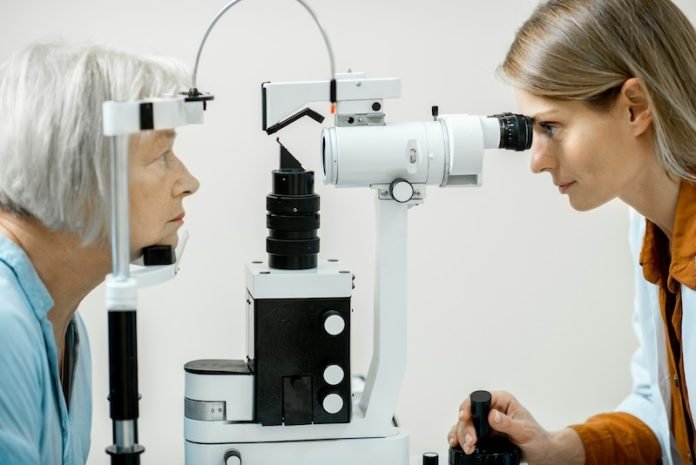
Age-related macular degeneration (AMD) is a common eye condition that primarily affects people over the age of 50. It leads to the loss of central vision, which is crucial for activities like reading, driving, and recognizing faces.
AMD does not affect peripheral vision, so it doesn’t lead to complete blindness, but the impairment it causes can significantly impact quality of life.
Understanding the causes and mechanisms of AMD can help manage this condition more effectively. This article simplifies the current research and explains it in plain language.
AMD affects the macula, the part of the retina responsible for clear vision in your direct line of sight. There are two main types of AMD: dry and wet. Dry AMD is more common and occurs when the macula thins over time as part of aging, gradually blurring central vision.
Wet AMD is less common but more severe and occurs when new blood vessels grow under the retina and leak blood and fluids, causing rapid damage.
Genetic Factors: Research shows that genetics play a significant role in the development of AMD. Specific genes have been linked to an increased risk of the condition, suggesting that if you have family members with AMD, you might be more likely to develop it too.
These genes are involved in the body’s immune response, inflammation, and the health of the retina.
Age: Age is the most significant risk factor for AMD. The changes in the macula that lead to AMD typically start to occur as people age. Most people with AMD are diagnosed after age 50, and the risk continues to increase with age.
Smoking: Smoking significantly increases the risk of AMD. Smokers are up to four times more likely to develop AMD compared to non-smokers. Smoking contributes to oxidative stress and inflammation, which can damage the macula.
Diet and Nutrition: Diet also influences the risk of developing AMD. Diets high in saturated fats, found in foods like meat, butter, and cheese, can increase the risk.
Conversely, a diet rich in leafy green vegetables, fruits, and other foods high in antioxidants can help reduce the risk. Nutritional supplements, particularly those containing lutein, zeaxanthin, and omega-3 fatty acids, are often recommended to help slow the progression in people with existing AMD.
Sunlight Exposure: Exposure to sunlight, particularly UV and blue light, may increase the risk of AMD. Protective eyewear that blocks these rays can help minimize the risk.
Cardiovascular Health: There’s a notable link between heart health and eye health. Conditions like high blood pressure and high cholesterol, common markers of poor cardiovascular health, can increase the risk of AMD.
These conditions affect the blood vessels in the eyes similarly to how they affect blood vessels in other parts of the body.
Ongoing research into AMD is focusing on understanding the detailed mechanisms at play, particularly how inflammation and the body’s immune system contribute to the condition.
Recent advancements include the development of anti-VEGF therapy for wet AMD, which involves medication that stops the growth of new, harmful blood vessels under the retina. This treatment has been a breakthrough, significantly improving the prognosis for wet AMD.
Researchers are also exploring gene therapy as a potential avenue for treating AMD. This would involve correcting the underlying genetic issues that cause the retina to deteriorate.
While still in the early stages, gene therapy holds promise for potentially curing or significantly halting the progression of AMD.
Understanding and managing AMD is crucial as the population ages. Lifestyle changes, protective eyewear, and proper nutrition play key roles in prevention, alongside medical treatments for those already affected.
With continuous research and development in treatments, the future for those with AMD is becoming increasingly hopeful, promising better management strategies and improved quality of life.
If you care about eye health, please read studies about Western diet may increase vision loss risk in older people and MIND diet may reduce risk of vision loss disease.
For more information about eye disease, please see recent studies about how to protect your eyes from glaucoma, and results showing this eye surgery may reduce dementia risk.
Copyright © 2024 Knowridge Science Report. All rights reserved.



